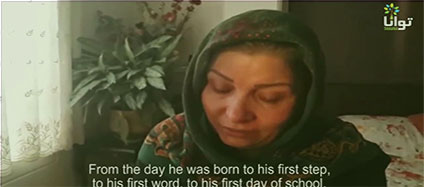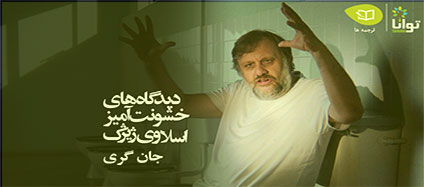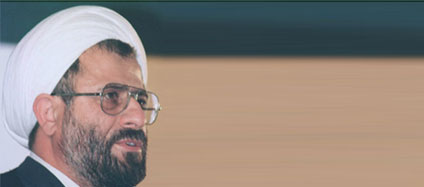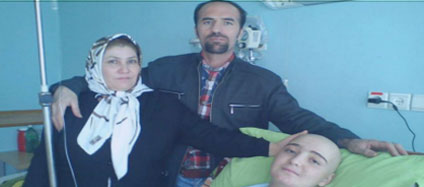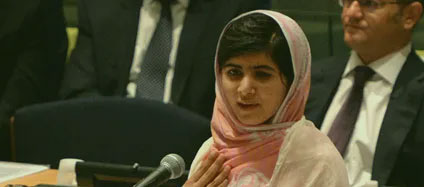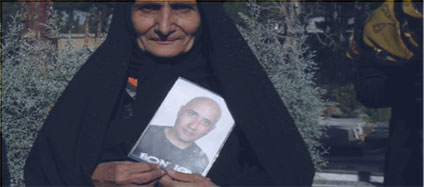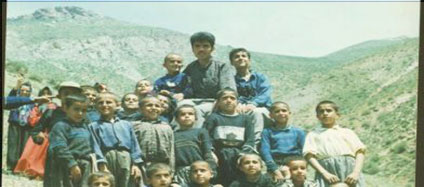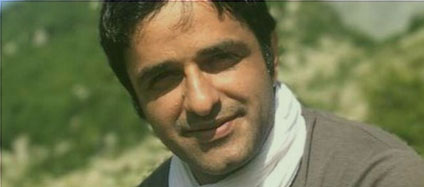Hashem Khastar is a retired Iranian educator and teachers’ rights activist. He serves on the board of directors of the Lettered Persons’ Union Center of Khorasan, an organization dedicated to teachers’ labor issues. Khastar was born in Birjand, present-day South Khorasan, in 1953. Khastar studied agriculture at the University of Urmieh and married his wife, fellow teacher Sadiqeh Malaki, while performing his compulsory military service in 1977/1978.
Khastar was politically active during his time as a student and soldier, describing his efforts against the Shah’s government as “a struggle for freedom and democracy.” Khastar was arrested twice (courts cleared him of charges both times) and barred from two semesters of university study for his political involvement. Following the revolution, he was encouraged to run for office in the province of Azerbaijan. Khastar rejected the proposition, returning to Birjand to teach agriculture at a technical school. In 1984/1985, he began his career as a teacher in the Iranian educational system.
As a teachers’ rights activist, Khastar faced much heavier persecution at the hands of the Islamic Republic regime – a regime he believes is much more repressive in security matters than the Shah’s government. Khastar was first arrested by Islamic Republic agents in 2004/2005 and given a suspended sentence of two years. In 2007/2008, a court ordered his wages garnished after he participated in a gathering of teachers. Khastar was arrested again on June 15, 2009 and initially sentenced to six years of incarceration, a verdict which was reduced to two years upon appeal. For the duration of the time he spent serving this sentence at Vakilabad Prison in Mashhad, authorities denied Khastar furlough, and kept him in custody 45 days after his sentence was complete. He was ultimately freed on bail on 2011/2012.
In 2013/2014, Khastar spent another 37 days in prison after not paying a two-million toman fine (c. 475 USD) to which he had been sentenced for the offense of “spreading lies and propaganda against the regime.” Denied adequate medical attention in unhygienic and overcrowded conditions at Vakilabad, Khastar wrote a letter to the head of Iran’s judiciary. In it, he stated that “Prison brings honor, and from prison honor readily shakes the foundations of corrupt power. If they cut out my tongue, I’ll write with my hands.”
In a January 2017 letter addressed to Supreme Leader Ali Khamenei, Khastar warned that “The cries of the people over your government’s injustice have reached the highest heavens… Fear the people’s wrath.”
Khastar does not believe in taking part in the Islamic Republics’ elections. He believes that Reformists are incapable of democratizing Iran’s political structure and is critical of the monopoly which the Reformists and Principlists hold over the country’s political space. Khastar stresses that international supervision, pressure from the international community, and online domestic protest over the treatment of political activists are effective means of changing security forces’ behavior. “I remember that 25 years ago, when they wanted to summon me over some small issue, they talked to me with curse words and coarse language. Now they call me and say, ‘Mr. Khastar, please come negotiate with us.’ International pressure and public vigilance have softened their behavior,” Khastar explains.
Letter: “Resign for your Own Sake, Mr. Khamenei”
Mr. Khamenei! O heroic nation of Iran! So long as Iran’s political problem – religious tyranny – goes unresolved, and freedom and democracy are not attained, the Iranian people will not rest.
Mr. Khamenei: do you accept that it is your presence in the position of Supreme Leader that has brought down these crippling US sanctions? Then resign, sir – not for the sake of the country, not for the sake of the Ministry of Intelligence agents and Revolutionary Guards and clerics, not for the sake of your family, but for your own sake.
Mr. Khamenei: are you aware of a democratic country, one with freedom and democracy – the requirements of democratic governance – which has been put under such sanctions by the United States and United Nations? Do you know, Mr. Khamenei, of a democratic country which is like your government at war with the whole world, including its own neighbors?
Mr. Khamenei: do you accept that, in a free and democratic election, you will have no place in our country, and as a result there will be no tensions between Iran and our neighbors and the world, including the United States? You may perhaps respond negatively, that the Council of Experts chose you. But the Council of Experts chose you only temporarily: you have perpetuated your rule as Supreme Leader through your pawns among the regime’s leadership and approbative supervision through the Guardian Council.[1] The Iranian people have refused to vote in sham elections – including elections for the Council of Experts, the range of candidates for which you’ve narrowly limited – to oppose you and the likes of Sheikh Mohammad Yazdi and Mesbah Yazdi, who are very close to you. They have, moreover, taken every protest slogan related to issues of labor and work and politicized it – and such slogans quickly become demands against you (e.g “Death to the dictator,” “Khamenei lives like a god, the people like beggars,” “Whether Principlist or Reformist, the jig is up.”) You won’t believe that the Iranian people, who face disaster because of your foolishness, don’t want you?
Mr. Khamenei: America has become the world’s mightiest economic and political force. Do you know why? Starting 230 years ago, the American people have gone to their ballot boxes and chosen their representatives and presidents for two terms at most. Moreover, Americans have between them some 600,000 guns, so that if their government begins to slide into tyranny they may fight to restore democracy. 230 years ago in Iran, Agha Mohammad Khan Qajar ruled, gouging out mounds of eyes from the people of Kerman and committing massacres in Tbilisi. Just 30 years ago, in the summer of 1988, Mr. Khomeini massacred 30,000 political prisoners who had either served their sentences or had been given, at most, life in prison. One of the death panel judges involved in those killings, Mr. Pourmohammadi, is now the head of the Ministry of Justice, while another, Mr. Ra’isi, helms the Ostan-e Qods Razavi Foundation, spending billions of tomans of Foundation funds on his presidential bid. (For 37 years I’ve owned a shotgun. They wouldn’t renew its license and told me I couldn’t do it under the name of immediate family either). Under you and Mr. Khomeini’s government, all the leaders of the political parties and organization have been put under house arrest, jailed, or executed, and the press has been shut down and taken care of.
Mr. Khamenei: Hitler emerged from a democracy, just a Khomeini’s government did. With his absolute dictatorship he pulled the world into a conflagration, caused the deaths of 80 million innocent people, and ultimately destroyed himself and his government while bringing Germany to ruin. But Germany emerged from the ashes, and with the blessings of freedom and democracy became the world’s third most powerful economy and Europe’s’ first. That which Hitler could not achieve through war – war which cost him even those things he did have – Germany’s post-war leaders attained through democracy and freedom. The G8 countries have become the world’s eight foremost industrial powers under democracy and freedom.
Mr. Khamenei: since the end of the Cold War, the United States has not intervened in any country to prop up tyranny. The opposite it is true: peaceably, encouragingly, it has helped countries under tyranny to move toward democracy. Even in those countries where it has intervened militarily – Afghanistan, Iraq, Libya – it strives to make sure government representatives come to power through free elections. In Afghanistan, it removed your enemies the Taliban from power, the moderate Karzai government replacing them. In Iraq, Mr. Nouri al-Maliki, a fan of yours, served as prime minister for eight years.
Now tell us, Mr. Khamenei: why is it that the U.S. has so unsparingly brought down these crippling sanctions on your government?
Mr. Khamenei: are you aware of a single free and democratic country in the world whose leaders are servants of the United States? On the contrary: all leaders of free and democratic governments are servants of their own people. The national interest is what’s important to the leaders of a free and democratic government. But, Mr. Khamenei, the interests of your regime are separate from those of the people, and your government is tyrannical. Hundreds of billions dollars were spent in the Iran-Iraq war after Khorramshahr was retaken, hundreds of billions of dollars have been spent on nuclear establishments, and hundreds of billions of dollars have been spent in Syria, Yemen, Lebanon, Gaza, Iraq, and Afghanistan… and hundreds of billions of dollars have been spent, and continue to be spent, in other places which bring nothing but poverty, disaster, and mass killing to the Iranian people and the Middle East. What’s the reason for this?
Mr. Khamenei: it is not I, but the former director of your Central Bank, Mr. Bahmani, who says that the money stored in the banks of the children of the elite is more than the government’s holdings. What does this mean? That the parents of these brats, who have a hand in power and government, have stolen and are storing their dollars in the overseas bank accounts of their children.
Mr. Khamenei: these spoiled elite children were birthed by your tyrannical government. Why don’t you want to believe this?
Mr. Khamenei: Omar bin Abdol’aziz, the only Umayyad governor of good renown, once asked someone: what do you think of our governance? The person replied: “If a stream is clear at its source, it will be clear downstream, as well.” Amir Kabir, too, was able in a three-year span to bring about righteous government and provide worthy service in the face of tyrannical figures like Naser al-Din Shah, and his name went down in history for it. Do you accept that every fiber of your government, now passing into its 40th year, is overcome with a cancer-like corruption, a corruption unprecedented in the history of Iran, which proves the saying, “A stream muddy at the source is muddy till the end?”
Mr. Khamenei: Are your own children not among those spoiled elite kids with full overseas bank accounts?
We have no freedom of speech and no independent judiciary. According to the former president, Mahmoud Ahmadinejhad – who was closer to you than Hashem Rafsanjani – the head of the Judiciary, his brothers, and his daughter are all landgrabbers, embezzlers, and spies.[2] Now, with this judicial system, and with no freedom of expression, how can anyone prove that your own children are not among those with billions of dollars in their accounts?
Mr. Khamenei: once, when debated freedom and democracy, your supporters accused us of wanting freedom for homosexuals. Now, with all this poverty and flagrant vice we have all over Iran – especially in the city of Mashhad, your city -they keep quiet and have nothing to say against freedom-loving people’s defense of freedom and democracy.
Mr. Khamenei: a government has nothing to say to its people has died, and will soon be brought down by those people.
Mr. Khamenei: your operatives sow rumors among the people that if this government should fall, Iran will become another Syria. Mr. Khamenei: with the help of Hezbollah in Lebanon and Russian air power, you have been able to keep the criminal Bashar al-Assad in power in a patch of Syrian territory, with 400,000 deaths and millions of displaced persons to show for it. (The son and father have governed Syria for 50 years – I don’t know what kind of “republic” this is, to have not come to an end and become part of the inheritance of the Assad family). Were it not for you, Syria’s dictator would have gone, and Da’esh would never have arisen. Accept that Da’esh is something you’ve made. But in Iran, even with the continuation and deepening of the January 2018 protest movement, what country could stage a military intervention? Hezbollah in Lebanon? They’re just small fry. Russia? Russia has not yet forgotten its defeat in Afghanistan. Moreover, your hidden agents spread rumors among ordinary people that your government is much less merciful than the Shah’s was and will do much killing to preserve itself.
Mr. Khamenei: the Iranian people have proven that, once they’ve seen blood, they are spurred to great action. An example of this are the people of Mashhad: on May 30, 1992, after a child was killed by security forces in the Talab neighborhood, they sprang to action. Those who saw them said Mashhadis hadn’t made such an uprising even during the Revolution. They set fire to all the government centers in the city and took weapons from a number of police stations. The international community and its leaders at the United Nations don’t allow you to fire upon people who protest peacefully in the streets. Per the constitution, street protests which “do not disturb the foundations Islam” are to be free.
In practice, it is your government with its dysfunction which is driving people away from Islam. According to the Deputy Governor of Tehran, 90% of young people have abandoned religion. The people speak what is on their minds with repeated shouts of “They’ve made Islam a stair to climb / and afflict the people.”
Mr. Khamenei: in March/April 2018, agents of your Ministry of Information raided my house and took my laptop and cell phone. In April/May, they came to my garden, argued with me for two hours, and made a request I couldn’t fulfill (that I not mention the name of the Mojahedin-e Khalq in writings and interviews). Subsequently, with no judicial warrant, the phone lines for my house and cell phone, as well as the lines of my spouse, child, and grandson, were cut. They have not been reconnected. Your operatives asked me how long this government will stand. I told them that in 1977 I predicted that the Shah’s government would soon fall, and two years later it did. I showed them the palm of my hand and told them, “It’s as clear to me as the palm of my hand to me that with this systematic corruption – as the regime’s leaders themselves say – the Islamic Republic, too, will soon go.” I now tell this to you, too, Mr. Khamenei! Fear and terror have left the people, and they’ve come to an awareness that the root of all their miseries is religious tyranny, and that present conditions in the Islamic Republic are the same the Shah’s government faced in 1978/1979. Until the country’s political problem – the same tyranny – is resolved, until we’ve achieved freedom and democracy, the people shall not rest, and the movement which started in January 2018 shall continue.
Mr. Khamenei: Mr. Gholam Reza Haydari, a member of the Majles, says that the Iranian people have understood that the parliament and presidency are incapable of doing anything. His analysis is that the all-encompassing powers of Mr. Khamenei and his office have come to exceed those even of the Shah, that no institution or individual is accountable, that corruption reigns over every individual or institution whose unaccountability is equal to their powers, and that the Iranian people now see this rampant corruption with their own eyes.
Mr. Khamenei: history shall record that after the government of the Pahlavis, a government of Mullahs came and killed (executions, war casualties, the extrajudicial killings of dissidents), devoured (embezzlements in the billions), took (the savings accounts of the elites’ children), and burned (the people burn in poverty and vice and addiction and unemployment and inflation).
Seyyed Hashem Khastar, Representative of Free Teachers
Mashhad, Iran
September 2018
(Until we have democracy, long live prison!)
[1] The Guardian Council uses the theory of “approbative supervision” (nazarat-e estesvabi) to justify its highly ideological vetting of candidates for elected office, one of many impediments to truly free elections in the Islamic Republic’s system.
[2] Sadegh Larijani, head of Iran’s judiciary, has two brothers in influential regime positions: Ali Larijani, speaker of the Iranian parliament, and Mohammad Javad Larijani, director of a body within the judiciary entitled the “Human Rights Council.”

